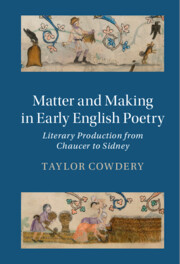Book contents
- Matter and Making in Early English Poetry
- Cambridge Studies in Medieval Literature
- Matter and Making in Early English Poetry
- Copyright page
- Contents
- Acknowledgments
- Abbreviations and Editorial Conventions
- Introduction
- Chapter 1 Words and Deeds in Chaucer
- Chapter 2 Gower and the Crying Voice
- Chapter 3 Hoccleve and the Force of Literature
- Chapter 4 Lydgate and the Surplus of History
- Chapter 5 Copy and Copia in Skelton
- Chapter 6 Wyatt’s Grace
- Epilogue
- Notes
- Bibliography
- Index
- Cambridge Studies in Medieval Literature
Chapter 2 - Gower and the Crying Voice
Published online by Cambridge University Press: 15 June 2023
- Matter and Making in Early English Poetry
- Cambridge Studies in Medieval Literature
- Matter and Making in Early English Poetry
- Copyright page
- Contents
- Acknowledgments
- Abbreviations and Editorial Conventions
- Introduction
- Chapter 1 Words and Deeds in Chaucer
- Chapter 2 Gower and the Crying Voice
- Chapter 3 Hoccleve and the Force of Literature
- Chapter 4 Lydgate and the Surplus of History
- Chapter 5 Copy and Copia in Skelton
- Chapter 6 Wyatt’s Grace
- Epilogue
- Notes
- Bibliography
- Index
- Cambridge Studies in Medieval Literature
Summary
Scholars have often characterized John Gower as a moralizing and even severe poet, one for whom obedience to normative law is the sole ethical standard. I suggest that this is only half of the picture. On the one hand, Gower certainly relies on prescriptive forms, such as the exemplum, distinctio, and the microcosm, to make the ethical lessons of his poetry legible to the reader. But on the other, he also draws the reader’s attention to moments in his poetry when a strict obedience to normative forms of ethics leads his characters into moral error. Gower does this by staging for his reader moments in which these characters cry out to various figures of power, begging those figures to suspend ethical norms in the name of mercy and pity. I argue that, in his three long poems—the Mirour de l’omme, the Vox Clamantis, and especially the Confessio Amantis—this “crying voice” casts light upon Gowers views of ethics and poetics alike, by stressing at once the flexibility of Gowers moral views and his commitment to listening, if only in conceit, for the voices that are latent in the matter he reworks.
- Type
- Chapter
- Information
- Matter and Making in Early English PoetryLiterary Production from Chaucer to Sidney, pp. 52 - 82Publisher: Cambridge University PressPrint publication year: 2023

